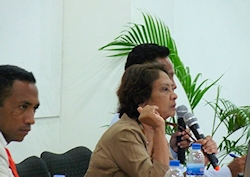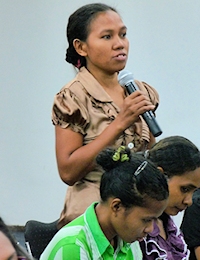Unique Learning Opportunity in Timor-Leste
Date:
Author: Aisling Walsh
“It is important that the government has opened up a space for civil society to give their comments about the content of the CEDAW (Convention on the Elimination of All Forms of Discrimination Against Women) report” commented Silverio Pinto Baptista, Deputy Ombudsperson for Human Rights in Timor-Leste, following a day long workshop with former CEDAW Committee member, Ms. Shanti Dairiam. The CEDAW Committee supports countries that have ratified CEDAW by monitoring their progress in line with the statutes set out in the treaty, and Dairiam’s advice in Timor-Leste’s reporting process to the CEDAW Committee has been invaluable.

Shanti Dairiam at the CEDAW validation workshop with members of the government in Dili, May 2013
Credit: UN Women/Aisling Walsh
As Timor-Leste prepares for its second and third periodic report to the CEDAW Committee, members of government and civil society took part in a week long process of workshops, consultations and learning sessions with Dairiam who currently sits on the Board of Directors for International Women’s Rights Action Watch (IWRAW) Asia-Pacific. During her visit she engaged extensively with staff from the Secretary of State for the Promotion of Equality (SEPI) as they prepare to submit the report.
The CEDAW validation workshop took place as part of a larger collaborative initiative between SEPI and UN Women to support the CEDAW reporting process. With UN Women’s support, the government of Timor-Leste established a number of Gender Working Groups who monitor the implementation of CEDAW and coordinate the promotion of gender equality in all government policies at national and district level. The Gender Working Groups collect information on Timor-Leste’s progress in implementing CEDAW. UN Women have assisted with the design of the questionnaire used to collect the information, and in systematizing the reporting process to allow the government to develop guidelines on improving future reporting processes.
UN Women further supported SEPI in organizing two consultative workshops, in February and during Dairiam’s visit with Government ministries and civil society to provide an opportunity to learn about the CEDAW reporting process, and to contribute to the content of the report. Dairiam stressed that the CEDAW reporting process is an important “learning opportunity for all of us.” It is a way of monitoring the government’s progress in achieving equality for women and an opportunity to gather ideas on how the situation of women could be further improved in Timor-Leste. Most importantly, Dairiam explained that the CEDAW Committee’s recommendations are an advocacy tool that civil society can use to hold the government accountable for its international obligations to promote women’s empowerment and equality.
Participant asking questions about the CEDAW reporting process at the CEDAW validation workshop in Dili, May 2013
Credit: UN Women/Aisling Walsh
Baptista further added that “the information Ms. Dairiam shared with us was very encouraging for the upcoming work on the alternative report.” The Office of the Human Rights Ombudsperson will be submitting a complementary report to the CEDAW Committee and Rede Feto, the umbrella organization linking women’s groups will also be producing an alternative report based on data collected from their members. Dinorah Granadeiro, a member of Rede Feto, commented that Ms. Dairiam’s “visit was very important because she provided new information about the next steps that need to be taken for completing the shadow report.”
Following Dariam’s mission UN Women has worked closely with SEPI to ensure that her recommendations were taken into account by SEPI when finalizing the CEDAW report. The finalized report has been approved by the Timor-Leste Council of Ministers and will be submitted to the CEDAW committee in the coming weeks.